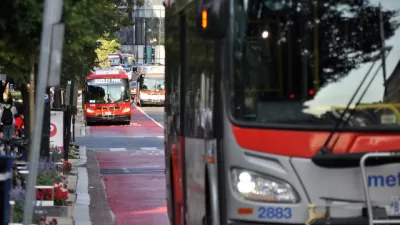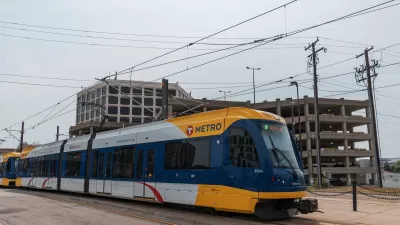Angie Schmitt takes issue with the controversial premise of a recent story from the popular Freakonomics guys. True to their reputation for counter-intuition, their most recent report makes the claim that "driving is greener than transit."

In a recent, attention-grabbing story for Marketplace, Stephen Dubner of Freakonomics fame explores what Schmitt contends is an "intellectually dishonest argument" about the relative environmental friendliness of driving a car versus taking public transit. Clemson University’s Eric Morris, a regular contributor to the program, walks Dubner through the argument for the benefits of the car based on per-passenger energy consumption.
As Schmitt explains, "Buses are potentially much more efficient than cars, Morris admits. But many buses are underutilized: The average bus carries just 10 passengers, while the average car carries 1.6. As a result, Morris says, those traveling by bus consume 20 percent more energy per passenger than people driving in cars."
While Schmitt seems to agree with Morris's assertion that "if we can persuade more people to leave cars and move onto the existing transit system that we already have, that's a complete win for the environment," she takes issue with his simplistic argument against building new transit in places like Cleveland, Pittsburgh and Memphis.
"Clearly, many American cities need to repair decades’ worth of damage to the walkable urban fabric that makes transit efficient and well-used," says Schmitt. "They also need to build better transit so new walkable development can flourish."
"Dubner notes at the beginning that New Yorkers have the smallest per-capita carbon footprint in the United States, but he never fully explains why places with good transit like New York, Boston, and San Francisco also have some of the lowest energy consumption rates in the country. There’s no reason places like Cleveland, Pittsburgh, and Memphis can’t join them as green cities with great transit."
FULL STORY: Freakonomics Hucksters: “Save the Earth, Drive Your Car”

Planetizen Federal Action Tracker
A weekly monitor of how Trump’s orders and actions are impacting planners and planning in America.

Map: Where Senate Republicans Want to Sell Your Public Lands
For public land advocates, the Senate Republicans’ proposal to sell millions of acres of public land in the West is “the biggest fight of their careers.”

Restaurant Patios Were a Pandemic Win — Why Were They so Hard to Keep?
Social distancing requirements and changes in travel patterns prompted cities to pilot new uses for street and sidewalk space. Then it got complicated.

Platform Pilsner: Vancouver Transit Agency Releases... a Beer?
TransLink will receive a portion of every sale of the four-pack.

Toronto Weighs Cheaper Transit, Parking Hikes for Major Events
Special event rates would take effect during large festivals, sports games and concerts to ‘discourage driving, manage congestion and free up space for transit.”

Berlin to Consider Car-Free Zone Larger Than Manhattan
The area bound by the 22-mile Ringbahn would still allow 12 uses of a private automobile per year per person, and several other exemptions.
Urban Design for Planners 1: Software Tools
This six-course series explores essential urban design concepts using open source software and equips planners with the tools they need to participate fully in the urban design process.
Planning for Universal Design
Learn the tools for implementing Universal Design in planning regulations.
Heyer Gruel & Associates PA
JM Goldson LLC
Custer County Colorado
City of Camden Redevelopment Agency
City of Astoria
Transportation Research & Education Center (TREC) at Portland State University
Camden Redevelopment Agency
City of Claremont
Municipality of Princeton (NJ)




























